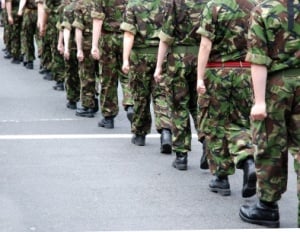
When it comes to family life there are always hurdles to overcome.
Every family faces challenges and getting through them is part of life as a family unit.
Unfortunately not every family makes it through these challenges. We know this only too well, since many of these families need to employ our services to help them separate.
For military families the strains placed upon family life can be greater than those faced by civilian families, with long deployments overseas and regular relocations due to postings just two of the tough situations these families face.
With that in mind we thought we’d use this blog as a chance to have one of our armed forces law experts take a look at four factors separating military couples with families need to consider, which civilians may not have to.
1 Pension
Military pensions are typically generous and can be the cause of disputes during separations.
If separating parties remain married the rights of the non-service spouse are unaffected. If they divorce, the non-serving spouse loses their automatic rights to a pension or death in service benefits upon the granting of Decree Absolute. The courts have powers to make Pension Sharing Orders which, effectively, give the non-serve spouse a bite of the service pension.
Rules in relation to pension on divorce are complicated so it is essential to get advice from a solicitor who specialises in these matters, but as the pension may well be the most valuable asset the parties have expert legal advice is likely to be a good investment
2 Resettlement Grants
Military families can be entitled to resettlement grants when a serving member of the forces leaves the forces.
Again, this grant can cause disputes if a separation occurs.
When service personnel leave the forces they are often entitled to a resettlement grant, which may be significant. Disputes can arise on separation about how grants should be used – for example should it be used to help retrain (as arguably intended), or to re-home the family. The outcome will depend upon needs, if there isn’t enough to meet the family’s needs without putting the fund into the pot, in the pot it will go.
3 Married Quarters
Many military families live in married quarters, rental of which is dependent upon a member of the family serving in the forces.
This is often the cause of dispute during break ups, for obvious reasons.
The former spouse has no right to remain in married quarters following divorce. This means that if the member of the armed forces moves out or the property the remainder of the family is likely to be evicted. If there is no alternative but to look to the local authority to re-home the family it is important that the family does not move out voluntarily, otherwise the local authority will be under no legal obligation to help – even if there are children involved.
4 The Children
As with any divorcing couple that has children, there is often a dispute over where the children should live when military couples separate.
With military couples this is often complicated by the serving partner’s job – since their role often impacts their ability to be the full time carer for a dependent child.
The courts are committed to trying to ensure that children maintain a relationship with both parents upon separation, and there is an assumption that children should be able to spend time with both parents, if it is safe to do so. A parent’s rights and responsibilities aren’t removed because of separation or divorce, although there may be practical difficulties if parents live some distance apart. It is commonly acknowledged that children do better if they maintain healthy relationships with both their parents and so separating parents have a responsibility to try and ensure this happens. Courts will only step in and make orders about a child’s relationship with their parents if it is necessary to do so.
Need some advice? Get in touch today
"*" indicates required fields
The information submitted here is used and stored for the purpose of replying to the enquiry. For more information on how we process data please visit our Privacy Policy.










